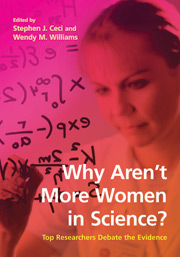New book asks, 'Why Aren't More Women in Science?'
By Susan S. Lang

Is the reason why more women don't go into science or engineering because teachers, parents or others hold them back? Is it because they are not as interested in scientific fields as they are other disciplines or because they aren't up to the math and science challenges? Or is it because such institutional barriers as biased promotion practices prevent them from pursuing tenure and launching a family at the same time?
These are the issues explored in the new book, "Why Aren't More Women in Science? Top Researchers Debate the Evidence," edited by Cornell professors of human development Stephen J. Ceci and Wendy M. Williams.
"Specifically, we examine the question of how much of the variance in successful scientific performance is attributable to cognitive differences between men and women," write the editors in their introduction. "Readers will also find discussions of many noncognitive factors, such as willingness to work excessively long hours at one's science job, the demands outside of the job that impinge on women's science participation and why there continues to be debate about the meaning of the constructs of ability, achievement and intelligence."
The need to discuss the issues is critical, write the authors, considering that at the top 50 universities, the proportion of full professorships held by women ranges from 3 to 15 percent. For example, although women earned 31 percent of chemistry Ph.D.s between 1993 and 2003, they were hired for less than 22 percent of the assistant professorships in 2002. Similar underrepresentations can be found in other mathematically intensive fields.
The book includes 15 essays on gender differences written by top researchers from the United States, Canada and the United Kingdom, who at times, Ceci and Williams note, interpret the same data on the causes and consequences of so few women in certain fields of science differently. The essays range from discussing the role of prenatal and postnatal hormones on spatial cognition and the claim that female babies are "naturally" more oriented toward people than are male babies (who are more oriented toward objects) to discussions on the differences between female and male brains and social factors pertaining to balancing work and family.
"At last! Psychological science enters the 'Great Debate' over women and science, salvages it from emotional rhetoric, and sends us on with profound new understandings of this complex issue," writes Frank Farley, past president of the American Psychological Association and an educational psychology professor at Temple University. "Read no other material on women in science until you've digested this book. This is the read of the year in psychology and education. Any steps forward will have to be based on this comprehensive, solidly scientific volume."
Media Contact
Get Cornell news delivered right to your inbox.
Subscribe